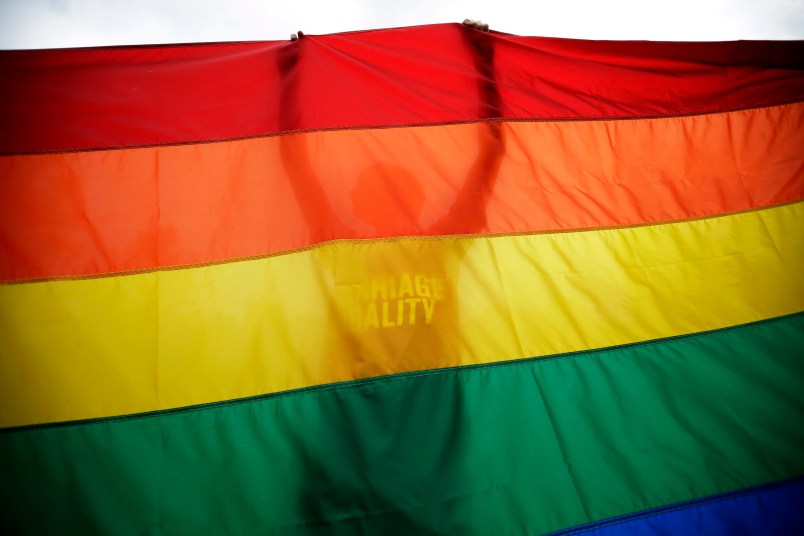AUSTIN, Texas (AP) — A lawyer representing Texas asked a federal judge Wednesday to reject pleas from two gay couples to suspend the state constitution’s definition of marriage as between one man and one woman, calling the legalization of same-sex marriages “a more recent innovation than Facebook.”
Mike Murphy, an assistant Texas solicitor general, told District Judge Orlando Garcia if he lifted the state’s voter-approved ban on gay marriage he would be injecting himself into a social and political debate that should be left to lawmakers.
“These questions are political questions, not constitutional rights,” he told the court. “Same-sex marriage is not included in the fundamental right of marriage … it is a more recent innovation than Facebook.”
Garcia scheduled Wednesday’s hearing, which he noted was on President Abraham Lincoln’s birthday, to consider a motion by two couples for a preliminary injunction immediately lifting the Texas gay marriage ban pending a trial later this year. Garcia did not immediately rule or give an indication when he might release a written decision but predicted this case, or one of 22 similar ones in other states, “will make its way to the Supreme Court.”
The case before Garcia is the first of its kind in Texas, and in the conservative 5th U.S. Circuit Court of Appeals. Mark Phariss and Victor Holmes filed a federal civil rights lawsuit complaining that Texas’ ban unconstitutionally denies them the fundamental right to marry because of their sexual orientation. The other lawsuit was filed by Cleopatra De Leon and Nicole Dimetman, who argue that Texas officials are violating their rights and those of their 2-year-old child by not recognizing their marriage license from Massachusetts.
Holmes and De Leon are both U.S. Air Force veterans who served in San Antonio, though both couples have since moved away.
Texas Attorney General Greg Abbott, a Republican running for governor, opposes legalizing gay marriage and has vowed to defend the law. But civil rights groups recently won injunctions against similar bans in Utah and Oklahoma relying on the same argument being cited in the Texas case — that banning gay marriage violates the equal protection clause of the 14th Amendment.
Neel Lane, an attorney for the two couples, dismissed the state’s argument that their rights were not violated because they are free to marry members of the opposite sex. He said that’s like holding someone’s head underwater and saying the person is free to breathe, just not air.
He also rejected Murphy’s argument that lawmakers did not exclude homosexuals by passing the ban but were trying to promote responsible procreation.
“If marriage is good for children, then it is irrational to prohibit homosexual couples who could have children from being married,” he said, pointing out that gays may adopt children in Texas.
While Garcia listened to arguments, another federal judge decided Wednesday that Kentucky must recognize gay marriages performed in other states. In a 23-page ruling, U.S. District Judge John G. Heyburn II concluded that the government may define marriage and attach benefits to it, but cannot “impose a traditional or faith-based limitation” without a sufficient justification for it.
In his comments from the bench, Garcia mentioned key civil rights laws passed after the end of the Civil War and pointed out that racial segregation and bans on interracial marriage were part of American tradition until federal judges declared them unconstitutional.
Attorneys general in other states have taken mixed approaches to court challenges to bans on gay marriage. Utah and Oklahoma are fighting rulings lifting their bans. In Nevada and Virginia, attorneys general have chosen not to defend them.
The couples denied that they are trying to redefine marriage or carve out a new constitutional right.
“Marriage is something when two people who are committed to each other, who love each other and who want to demonstrate that commitment,” Holmes said. “I think that is what the tradition is about and that tradition should apply to us.”
___
Follow Chris Tomlinson on Twitter at http://twitter.com/cltomlinson
Copyright 2014 The Associated Press. All rights reserved. This material may not be published, broadcast, rewritten or redistributed.






